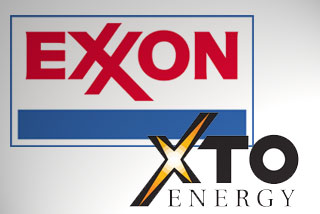XTO Energy, a subsidiary of Exxon Mobil, is under investigation by the Pennsylvania Department of Environmental Protection (DEP) after a 13,000 gallon hydraulic fracturing fluid spill at XTO Energy’s natural gas drilling site in Penn Township, Lycoming County, PA.
The spill was first discovered last week by a DEP inspector who found a valve had been left open on a 21,000-gallon fracking fluid tank, discharging fluid off the well pad into local waterways, threatening a nearby cattle herd that had to be fenced off from the contaminated pasture. Exxon/XTO has not provided an explanation on why the valve was left open.
“This spill was initially estimated at more than 13,000 gallons by the company and has polluted an unnamed tributary to Sugar Run and a spring,” said DEP Northcentral Regional Director Nels Taber. “There are also two private drinking water wells in the vicinity that will be sampled for possible impacts.”
DEP’s sampling confirmed elevated levels of conductivity and salinity in the spring and unnamed tributary, clear indications that the fracking fluid was present in the waterways.
Exxon paid $30 billion in its June 2010 merger with Texas-based XTO Energy, making Exxon/XTO the largest natural gas producer in the United States, with extensive holdings of “unconventional resources” throughout the Marcellus Shale and elsewhere.
Concerns over natural gas fracking are widespread through the Marcellus Shale region and in several Western U.S. states where a boom in natural gas development is underway thanks to the controversial hydraulic fracturing technique. Residents living near fracking operations are on the front lines as their drinking water supplies and health are threatened by the fracking process, which involves injecting a mixture of sand, water and undisclosed toxic chemicals into the shale rock to free up the trapped gas.
Pennsylvania is no stranger to fracking disasters, notably the high-profile contamination in the town of Dimock, where resident Norma Fiorentino’s water well famously blew up on New Year’s Day 2009, and at least 15 families have had their drinking water ruined by fracking, leading to illness, livestock deaths and other maladies.
Last week, the Pittsburgh City Council banned natural gas fracking within city limits due to concerns over the threat of water contamination and public health risks.
But Pennsylvania is hardly alone in the fracking fight. Fracking operations have contaminated water supplies across America from New York, to Wyoming, to New Mexico, to Ohio, to Virginia, to Arkansas, to Colorado and beyond.
The Environmental Protection Agency currently has no power to regulate hydraulic fracturing thanks to the Halliburton Loophole inserted into the 2005 enegy bill at the behest of former Vice President Dick Cheney, the former head of Halliburton.
Mounting evidence of the fracking threat nationwide has yet to convince lawmakers to close the loophole and hold the natural gas industry accountable for its fracking messes. As the New York Times asked in a November 2009 editorial, “if hydraulic fracturing is as safe as the industry says it is, why should it fear regulation?”
Subscribe to our newsletter
Stay up to date with DeSmog news and alerts







